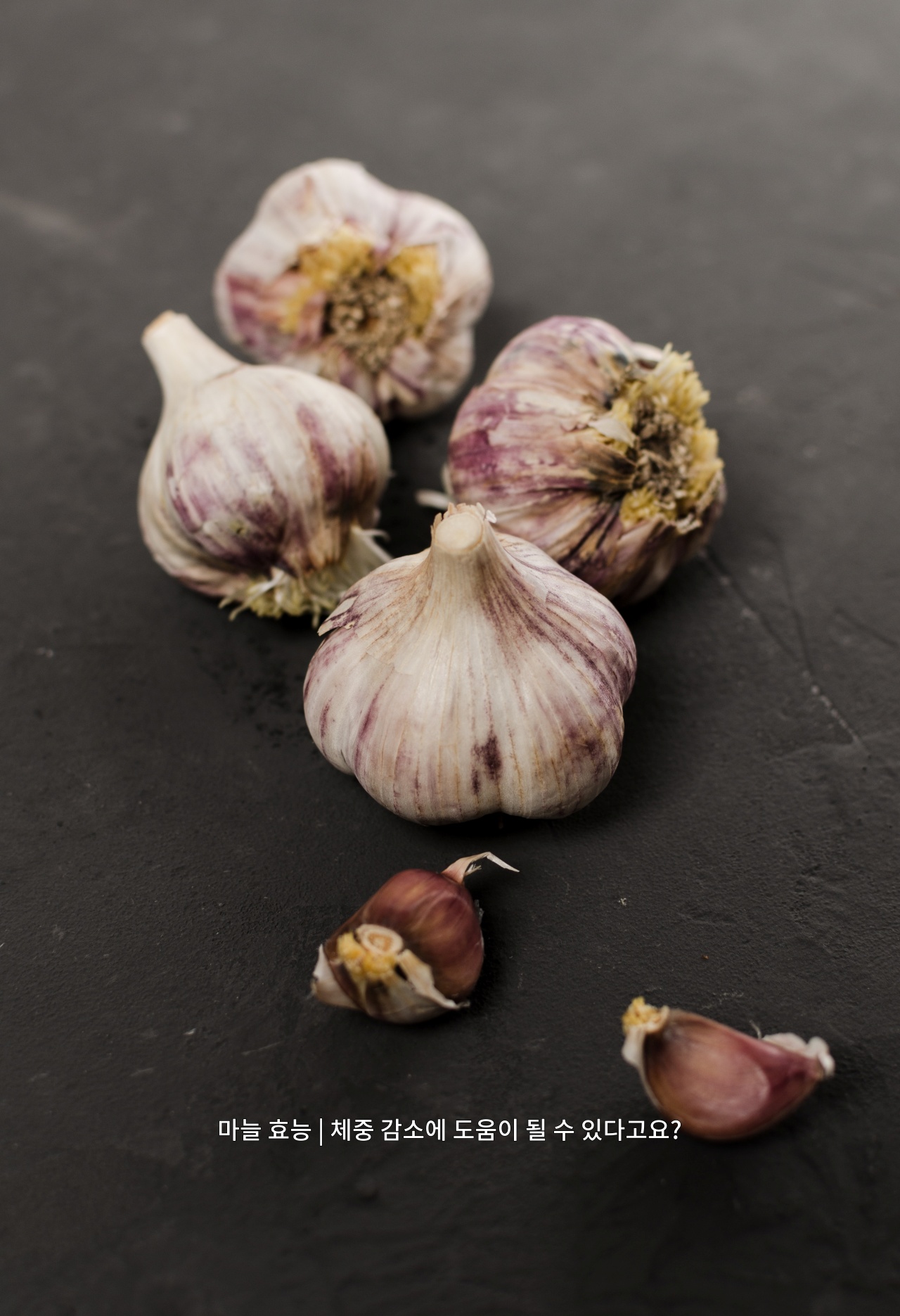마늘은 여러 연구에서 잠재적인 체중 감량 효과가 있는 것으로 밝혀졌습니다. 다음은 마늘이 체중 감량에 기여할 수 있는 작용 메커니즘과 이러한 메커니즘을 뒷받침하는 증거입니다.

마늘과 체중 감소
01_열발생 효과 (Thermogenic Effects | 써모제닉 효과)
마늘은 열발생 효과를 가질 수 있는데, 이것은 신체의 신진대사와 에너지 소비를 증가시켜 체중 감소로 이어질 수 있다는 것을 의미합니다. Journal of Nutritional Science and Vitaminology(영양과학과 비타민학 저널)에 발표된 연구에서, 마늘 보충제를 섭취한 참가자들은 마늘을 섭취하지 않은 참가자들에 비해 에너지 소비와 지방 산화가 증가하는 것을 보여주었습니다. International Journal of Obesity(국제 비만 저널)에 발표된 또 다른 연구는 12주 동안 마늘 보충제를 섭취하는 것이 에너지 소비를 증가시키고 체중과 BMI를 감소시키는 결과를 낳는다는 것을 발견했습니다.

02_식욕 억제
마늘은 포만감, 식사 후 포만감을 증가시킴으로써 식욕과 음식 섭취를 줄이는데 도움을 줄 수 있습니다. 유럽 임상 영양 저널에 발표된 연구에서, 마늘이 포함된 식사를 섭취한 참가자들은 마늘을 섭취하지 않은 참가자들에 비해 포만감이 증가하고 음식 섭취가 감소하는 것을 보여주었습니다. Journal of Nutrition에 발표된 또 다른 연구는 마늘 오일 보충이 과체중과 비만 여성들의 음식 섭취를 줄이고 포만감을 증가시키는 결과를 낳았다는 것을 발견했습니다.

03_지방 대사
마늘은 또한 체중 감소에 기여할 수 있는 지방 대사에 역할을 할 수 있습니다. Journal of Agricultural and Food Chemistry(농림식품화학저널)에 발표된 연구에서 마늘 보충제를 섭취한 참가자들은 마늘을 섭취하지 않은 참가자들에 비해 간에 지방 축적이 줄어들고 지질 대사가 개선되는 것을 보여주었습니다.

04_프리바이오틱 효과
마늘은 또한 유익한 장내 박테리아의 성장과 활동을 자극할 수 있다는 것을 의미하는 프리바이오틱 효과를 가질 수 있습니다. 이것은 체중 감소와 관련된 전반적인 내장 건강을 개선할 수 있습니다. Journal of Nutrition에 발표된 연구에서, 마늘 보충제를 먹은 참가자들은 유익한 장내 박테리아의 수치가 증가하고 해로운 박테리아의 수치가 감소하는 것을 보여주었습니다.

결론
전반적으로, 이 증거는 마늘이 열발생 효과, 식욕 억제, 지방 대사, 그리고 생물학적인 효과를 통해 잠재적인 체중 감소 이점을 가질 수 있다는 것을 시사합니다. 하지만, 이러한 메커니즘과 그것들이 어떻게 마늘의 체중 감량 효과에 기여하는지를 완전히 이해하기 위해서는 더 많은 연구가 필요합니다. 마늘을 건강한 식단과 생활 방식에 통합하는 것은 잠재적으로 체중 감량 노력을 강화하는 간단하고 풍미 있는 방법일 수 있습니다. 식단을 크게 바꾸거나 마늘 보충제를 복용하기 전에 건강 관리 회사와 상의하는 것이 중요합니다.
References
- Mahmood, K., et al. (2011). Effects of Allium sativum (garlic) on systolic and diastolic blood pressure in patients with essential hypertension. Pakistan Journal of Pharmaceutical Sciences, 24(3), 565-570.
- Hajarizadeh, B., & Malekmakan, L. (2016). Effect of garlic on lipid profile and expression of LXR alpha in intestine of hypercholesterolemic mice. Journal of Basic and Clinical Physiology and Pharmacology, 27(2), 151-156.
- Rahman, K. (2007). Effects of garlic on platelet biochemistry and physiology. Molecular Nutrition and Food Research, 51(11), 1335-1344.
- Ashraf, R., et al. (2013). Effects of Allium sativum (garlic) on some immunological and hematological parameters in rainbow trout, Oncorhynchus mykiss. Fish and Shellfish Immunology, 34(5), 1182-1187.
- Sobenin, I.A., et al. (2018). Lipid-lowering effects of time-released garlic powder tablets in double-blinded placebo-controlled randomized study. Journal of Atherosclerosis and Thrombosis, 25(2), 186-198.
- Ademiluyi, A.O., et al. (2013). Antidiabetic activity of garlic (Allium sativum) in alloxan-induced diabetic rats. Journal of Basic and Clinical Physiology and Pharmacology, 24(1), 23-27.
- Raji, Y., et al. (2015). Garlic and ginger administration ameliorated fibrinolysis and insulin resistance in diabetic rats. Pathophysiology, 22(2), 95-100.
- Jamilian, M., et al. (2017). The effects of garlic supplementation on metabolic status, oxidative stress, and pregnancy outcomes in women with gestational diabetes mellitus: a randomized, double-blind, placebo-controlled trial. Journal of Diabetes and its Complications, 31(2), 362-369.
- Feng, Y., et al. (2017). Effect of garlic powder on insulin resistance and glycosylated hemoglobin in type 2 diabetes mellitus: a meta-analysis. Journal of Traditional Chinese Medicine, 37(5), 631-638.
- Kojuri, J., et al. (2013). Effects of anethum graveolens and garlic on lipid profile in hyperlipidemic patients. Lipids in Health and Disease, 12(1), 176.
- Ali, M., et al. (2018). The effects of garlic supplementation on oxidative stress markers: a systematic review and meta-analysis of randomized controlled trials. Food and Chemical Toxicology, 119, 203-215.
- Bayan, L., et al. (2014). Garlic: a review of potential therapeutic effects. Avicenna Journal of Phytomedicine, 4(1), 1-14.
- Nagao, T., et al. (2008). Aged garlic extract improves adiponectin levels in subjects with metabolic syndrome: a double-blind, placebo-controlled, randomized, crossover study. Journal of Clinical Lipidology, 2(3), 240-245.
- Shabani, E., et al. (2017). Effects of garlic supplementation on serum inflammatory markers: a systematic review and meta-analysis of randomized controlled trials. Phytotherapy Research, 31(3), 432-442.
'건강정보 (식품)' 카테고리의 다른 글
| 사과 효능 | 어떻게 사과가 면역 체계를 강화하고 감염과 싸울 수 있나요 (0) | 2023.03.07 |
|---|---|
| 마늘 효능 | 운동 능력 향상에 도움이 될 수 있어요 (0) | 2023.03.07 |
| 양파 활용 레시피 | 어니언링, 양파잼, 어니언수프 (0) | 2023.03.07 |
| 레몬 효능 | 어떻게 면역 체계를 강화시킬 수 있나요? | 면역력 높이는 음식 (0) | 2023.03.06 |
| 애플 사이다 비니거 효능 | 소화, 체중 감량, 혈당 조절 (0) | 2023.03.06 |




댓글